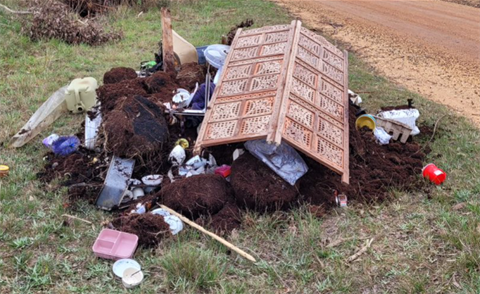Dumping waste illegally

Report dumped waste
Whether its furniture, tyres, or bags of rubbish, most of us have come across illegally dumped waste.
Illegal dumping can include:
- Placing unwanted household items on the kerbside, or next to charity donation bins
- Dumping rubbish or green waste in bushland or on the side of roads
- Businesses or contractors who are paid to correctly dispose of waste, but instead dump it on roadsides or on land without the correct approvals
It’s illegal to dump, bury or burn any kind of waste at a location that isn’t licensed to accept it. This includes all roadsides, Council-owned parks, reserves, and buildings, and privately-owned land.
Putting rubbish from households or businesses in street litter bins, or into skip bins on building sites is also considered illegal dumping.
Report litter from vehicles
If you see someone littering from a vehicle or near the vehicle they are using, you can report to EPA Victoria. You can make litter reports to EPA online using the EPA web form. Further information about reporting litter from vehicles can be found on the EPA website.
Why is illegal dumping a problem?
Rubbish dumped on our kerbsides, on edges of roads, or in bushland can:
- Pollute our environment and waterways as the dumped rubbish is often scattered by wind or wild animals
- Make our streets unsafe and unattractive
- Introduce weeds into our sensitive bushland
- Contaminate soil with dangerous chemicals
Cleaning up dumped rubbish is expensive, costing hundreds of dollars for most clean-ups. Depending on the type of dumped rubbish, machinery and trucks are required to safely remove the dispose of the materials.
How can you help stop illegal dumping?
1. Take your waste to the right place.
Check what’s accepted at Council’s transfer stations
2. Report any illegally dumped waste to Council:
If you see someone dumping rubbish, do not approach them, but note anything that may help a future investigation. A number plate may be all that’s needed. The person’s appearance, the make and model of their vehicle or any other identifying features may also help.
3. Get proof from commercial disposal companies you hire.
When someone disposes of waste on your behalf, get proof that it was accepted at a waste disposal or recycling facility that has EPA permission to accept that type of waste. Keep a record of their business ABN, address and contact number so you can prove they collected your rubbish for disposal.
Remember, you are responsible for your waste.
4. If you own a property, know what is being brought onto your land.
Farmers, private and public landowners must not accept material without an appropriate permission. Clean fill is considered industrial waste and must be taken to a disposal site that is licensed to accept it.
For more information visit EPA Victoria
What happens when you report dumped waste?
All reports of illegal dumping are investigated by Council’s Litter Prevention Officer and fines may be issued. Fines of up to $9,000 can apply for illegal dumping.
Reporting illegal dumping also helps Council to identify hot spots, and strategies can be developed to prevent this behaviour in your local area.
Free recycling options at Council transfer stations
Taking waste and recycling to a transfer station often doesn't cost as much as you think.
Many household items are accepted free of charge, such as televisions, computers, polystyrene (up to 0.5m3), cardboard boxes and cardboard packaging (like from new furniture), and scrap metal such as barbecues, outdoor furniture and lawnmowers.
See what's accepted at each site and costs
Remember, Council provides all ratepayers with annual hard waste and green waste vouchers for free disposal of up to one cubic metre of general waste and green waste.
The vouchers are sent to the ratepayer’s primary postal or email address in July. Permanent tenants should ask their landlord or property manager if they can use these vouchers to clean up around the property they are renting.